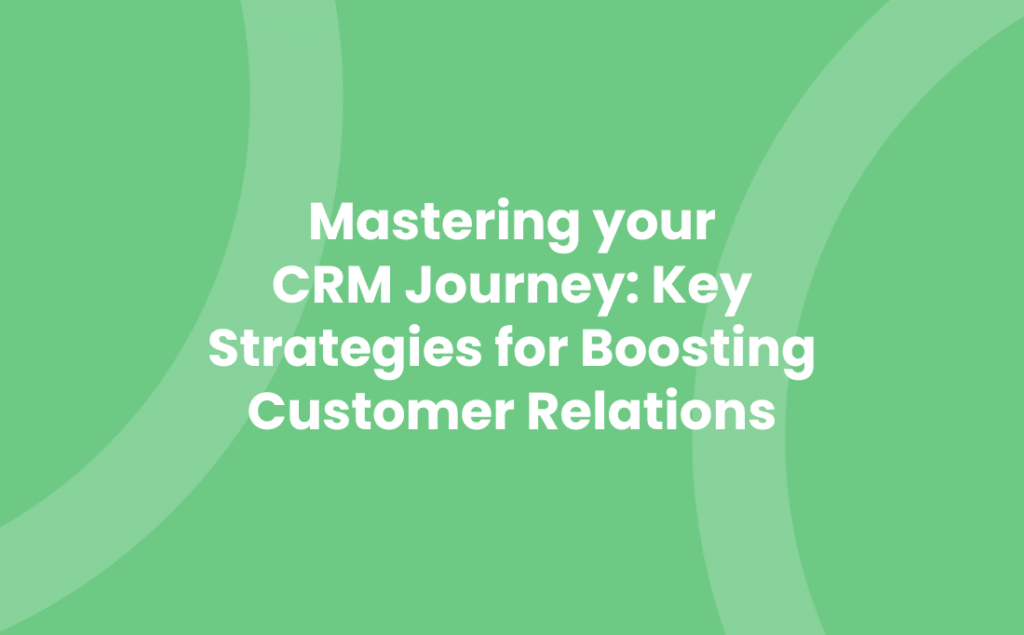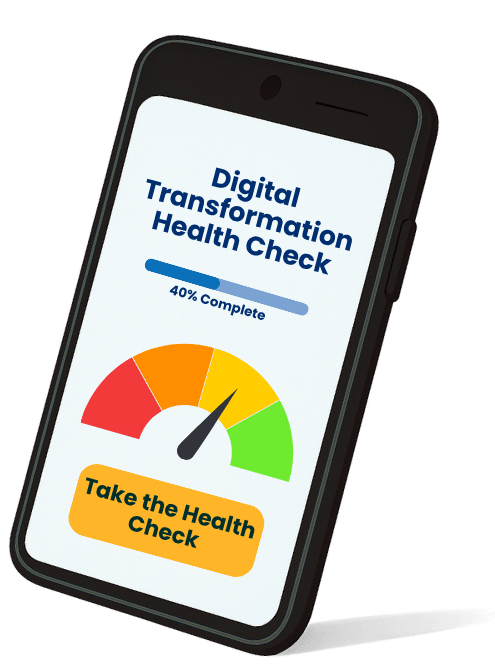Embarking on a CRM journey is a key step for any business aiming to streamline its customer relationships and drive sales growth. It’s not just about choosing a software; it’s about transforming the way you interact with your customers, understanding their needs, and ensuring they’re engaged and satisfied at every touchpoint.
With the right strategy, your CRM journey can unlock a treasure trove of insights, leading to more personalised marketing, improved customer service, and ultimately, a robust bottom line. Whether you’re at the starting line or looking to refine your current CRM practices, understanding the journey ahead is crucial. Let’s dive into how you can navigate this path effectively, making the most of your CRM to foster lasting customer relationships.
Understanding the Importance of a CRM Journey
Embarking on a CRM journey allows your business to not only select the right tools but also to strategise and personalise every interaction you have with your customers. This journey is crucial for building lasting relationships that lead to sustained sales growth and customer loyalty. Here’s why prioritising your CRM journey can be a game-changer for your business.
Firstly, understanding your customers’ needs and behaviours is key to tailoring your marketing and service efforts effectively. A CRM system isn’t just a tool for managing contacts; it’s a comprehensive solution for tracking customer interactions, preferences, and feedback across all touchpoints. This insight enables you to deliver personalised experiences that resonate with your target audience, driving engagement and loyalty.
Moreover, a CRM journey focuses on enhancing customer satisfaction at every stage of their interaction with your business. From the initial awareness phase right through to post-purchase support, a well-implemented CRM strategy ensures that customers feel valued and understood. This approach not only improves the overall customer experience but also boosts your brand’s reputation and encourages repeat business.
- Improved Customer Insights: By collecting and analysing data on customer interactions, businesses can gain a deeper understanding of their audience, enabling more targeted and effective marketing strategies.
- Enhanced Personalisation: Leveraging the insights gained from a CRM system allows for tailored communications and offers, significantly improving the customer experience and driving sales.
- Increased Efficiency: Automating routine tasks and providing staff with easy access to important customer information streamlines operations and allows for more time to be spent on high-value activities.
To truly leverage the potential of a CRM journey, it’s essential to view it as more than just a software implementation. Think of it as a strategic framework that touches every aspect of your customer interaction, from marketing and sales to customer service and feedback analysis. By continuously refining your approach based on real customer data, you make informed decisions that cater directly to the needs and desires of your audience.
Incorporating these strategies into your CRM journey doesn’t just enhance customer relations; it paves the way for improved marketing tactics, more effective customer service, and ultimately, increased profitability for your business. Remember, a CRM system is a powerful tool in your arsenal, but its true value is realised when it’s part of a holistic approach to customer relationship management and strategy execution.
Setting Clear Objectives for Your CRM Implementation
Embarking on a CRM implementation journey marks a key moment for your business. It’s not just about choosing a software solution; it’s about transforming how you interact with your customers. To ensure this transition not only succeeds but also delivers measurable benefits, it’s crucial to set clear, strategic objectives from the outset.
Firstly, identify what you want your CRM system to achieve. Are you looking to enhance customer satisfaction, increase sales, improve marketing efficiency, or all of the above? Specific, measurable, achievable, relevant, and time-bound (SMART) goals will keep your strategy focused and allow you to track progress effectively.
Consider the customer life cycle and how a CRM can facilitate an improved journey at every stage:
- Lead Generation: Better targeting and personalisation can significantly increase conversion rates.
- Sales Conversion: Streamlined sales processes and enhanced data accessibility can lead to higher close rates.
- Customer Service: Centralised customer information leads to quicker, more personalised service interactions.
- Customer Retention: Automated follow-ups and loyalty programmes can enhance customer satisfaction and retention.
Prioritising integration with your existing processes and systems is vital. A CRM should not be an isolated tool but a core part of your operational ecosystem. For businesses operating in today’s digital landscape, efficient data flow between systems is not just a convenience; it’s a necessity for timely and relevant customer engagement.
Training and user adoption are also key objectives that should never be overlooked. The most sophisticated CRM system will not deliver results if your team can’t or won’t use it effectively. Ensuring that your staff are well-trained and invested in the upcoming changes will facilitate smoother implementation and better outcomes.
Lastly, consider your long-term CRM vision. Implementing a CRM is not a one-off project but a continuous journey. Think about how your needs may evolve and ensure that your chosen solution is scalable and adaptable. Whether you’re expanding your product line, entering new markets, or scaling your operations, your CRM should support your growth every step of the way.
By setting clear objectives for your CRM implementation, you’re laying the foundation for a successful CRM journey. Remember, it’s not just about the technology; it’s about enhancing every interaction with your customers to build lasting, valuable relationships. Armed with well-defined goals and a comprehensive strategy, you’re well on your way to transforming your customer relationships and driving your business forward.
Choosing the Right CRM Software for Your Business
Selecting the perfect CRM software is essential to steering your CRM journey towards success. Not all CRM systems are created equal, and what works for one business might not be the best fit for yours. It’s crucial to assess several key factors to ensure the software you choose matches your business goals, integrates seamlessly with your current systems, and grows with you.
Identify Your Business Needs
Begin by pinpointing precisely what you need from a CRM system. Are you looking to improve customer service, boost sales, increase customer retention, or all of the above? Understanding your primary objectives will help narrow down the options. Consider the specific features that will benefit your business the most, such as sales forecasting, email marketing integration, or customer support functionalities.
Evaluate Integration Capabilities
A CRM system should not stand alone; it must integrate effortlessly with your existing tech stack. This includes everything from email platforms and social media tools to accounting software. Seamless integration not only streamlines your workflow but also ensures that all customer information is centralised, providing a holistic view of your customer interactions.
Consider Scalability
Your chosen CRM software should be capable of growing with your business. Scalability is key, as the demands of your business will evolve over time. Opt for a CRM system that offers flexible pricing plans, the ability to add more users, and expanded features as your business grows. This way, you’re not forced to switch systems down the line, which can be both disruptive and costly.
Test Drive with a Demo or Trial
Before making a final decision, it’s wise to test drive a few CRM options. Most providers, including Avrion, offer free demos or trials that allow you to explore the features, usability, and compatibility with your business needs. Use this opportunity to gather feedback from your team, as their daily operations will be directly impacted by the new software.
Choosing the right CRM software is a significant decision that shouldn’t be rushed. Take your time to research, evaluate, and test different options. Remember, the aim is to find a CRM system that not only meets your current needs but can also adapt to future challenges and opportunities. Always keep your business goals and customer experience at the forefront of your decision-making process.
Implementing CRM Best Practices for Optimal Results
When embarking on your CRM journey, it’s vital that you follow a strategic approach to reap the fullest benefits from your CRM system. Integrating best practices into your CRM implementation not only streamlines the process but also ensures that your business leverages the most value from the investment. Here are key strategies you should consider to achieve optimal results.
Understand Your Customer Journey
Understanding your customer journey is paramount. You need to map out every touchpoint your customers have with your brand, from initial awareness through to purchase and beyond. This insight helps tailor the CRM system to manage these interactions effectively, thus enhancing the customer experience and fostering loyalty.
Ensure Team Involvement
Getting your team involved early in the process is crucial. They’re the ones who’ll be using the CRM system daily. Encouraging their input on what features and functionalities are most necessary can lead to a more customised and user-friendly solution. Additionally, this can significantly boost user adoption rates, as team members are more likely to embrace a system they helped shape.
Invest in Training
Investing in comprehensive training cannot be overstated. A common pitfall in CRM implementation is the assumption that once the system is in place, everyone will naturally know how to use it. This is rarely the case. Adequate training ensures that your team is proficient in using the CRM system, leading to increased productivity and ensuring you get the most out of your investment.
Data Quality and Management
Data is at the heart of any CRM system. Keeping your data clean, updated, and properly managed is key to maintaining the integrity of your CRM system. Regular audits to identify and correct errors, removing duplicates, and updating outdated information will help in making data-driven decisions with confidence.
Continuous Evaluation and Adaptation
The market changes, and so do your business needs. Continuous evaluation of your CRM system and processes allows you to identify areas for improvement. Adapting your strategy and making necessary adjustments ensures that your CRM system evolves alongside your business, always aligning with your current objectives and challenges.
By implementing these best practices, you’ll not only enhance the efficiency of your CRM system but also create a solid foundation for your business’s growth. Remember, a successful CRM implementation is not just about technology; it’s about adopting a customer-centric culture that permeates every aspect of your business operations.
Measuring Success and Iterating on Your CRM Strategy
To truly comprehend if your Customer Relationship Management (CRM) journey is steering your business towards its goals, you’ll need to meticulously measure your successes and learn from the data you gather. This ongoing process ensures that your CRM strategy remains aligned with your business objectives, adapting and evolving as necessary.
Key Performance Indicators (KPIs)
First and foremost, identifying the correct Key Performance Indicators (KPIs) is essential. These metrics will be your north star, guiding your CRM strategy towards achieving business outcomes. Common CRM KPIs include:
- Customer Lifetime Value (CLV)
- Customer Retention Rate
- Sales Conversion Rates
- Lead Response Time
Each of these KPIs offers insight into different facets of your customer relationships and business operations, enabling you to refine your approach as needed.
Utilising Analytics
Leverage the power of CRM analytics to drill down into your data and uncover patterns and trends. This isn’t just about looking at the numbers; it’s about understanding the story they tell. What processes are yielding results? Where are there opportunities for improvement? By analysing your data, you can make informed decisions to enhance your CRM strategy.
Regular Reviews and Adaptation
The business landscape is constantly changing, and so too should your CRM strategy. Regularly reviewing your processes and performance against your KPIs is crucial. This may involve:
- Adjusting your sales process based on which tactics are shown to convert leads more effectively.
- Refining your marketing messages to better resonate with your target audience.
- Improving customer service protocols to increase satisfaction and retention rates.
Feedback Loops
Integrating feedback loops into your CRM strategy allows for continuous improvement. Solicit feedback from your customers and your team, and use this invaluable insight to iterate on your strategy. Remember, the end goal is to foster a customer-centric culture that supports your business growth.
Technology and Tool Evaluation
Finally, with the rapid pace of technological advancement, it’s worth periodically assessing if your current CRM software still fits your needs. New features and tools can offer improved automation, analytics, and customer insights that could take your strategy to the next level.
Conclusion
Embarking on your CRM journey is a pivotal step towards achieving a deeper connection with your customers and unlocking the full potential of your business. By focusing on the right KPIs and leveraging CRM analytics, you’re well-equipped to make data-driven decisions that can significantly enhance your customer relationships. Remember, the key to a successful CRM strategy lies in its flexibility and your willingness to adapt based on insights and feedback. As you continue to refine your approach, keep your business objectives and customer needs at the forefront. This commitment to evolution and customer-centricity will not only improve your CRM outcomes but also propel your business towards sustained growth and success.
Frequently Asked Questions
What are the key indicators for CRM success?
Customer Lifetime Value, Customer Retention Rate, Sales Conversion Rates, and Lead Response Time are crucial KPIs for measuring the success of CRM strategies. Identifying and tracking these indicators helps in assessing the effectiveness of CRM implementations and guiding strategic decisions.
How can CRM analytics improve decision-making?
CRM analytics play a vital role in improving decision-making by uncovering patterns and trends within the data. This insight enables businesses to make informed choices, tailoring strategies to better meet customer needs and business objectives.
Why is it important to regularly review CRM strategies?
Regular reviews of CRM strategies are important to ensure alignment with business objectives and adapt to changing market conditions. This process includes evaluating the effectiveness of current practices, incorporating feedback, and making necessary adjustments to stay competitive and customer-centric.
How does a customer-centric culture contribute to business growth?
A customer-centric culture fosters sustained business growth by prioritising customer satisfaction and loyalty. It ensures that the CRM strategy and overall business operations are aligned to meet customer needs, leading to higher retention rates and attracting new customers through positive word-of-mouth.
We are ready to take our CRM journey to the next level
“We need to take advantage of our CRM to develop some integrations with in-house operating and finance systems.”
Once you have an established CRM solution with some integrations and triggers in place, it would be advantageous to look at how you should evolve. It goes without saying that a good CRM partner should take the time to understand your business and how it runs. But helping you evolve over time and looking at ways to maximise efficiency within your operating, finance, and CRM systems is key to ensuring longevity and continued success.
This is where business process automation and middleware solutions can really help. We have successfully completed projects for automating invoicing and statement activities, which can be convoluted, time consuming tasks. These type of automations help the end-to-end process for the sales team – from sales quotes, right through to contract-creation – which are sent and signed all from within CRM. Our work with Codeless Platforms’ BPA Platform makes the reports and information that’s available from your system in an automated way truly remarkable.
Taking systems even further, we have developed middleware software, using industry standard frameworks, to create unique business applications that automate tasks and processes where speed and efficiency is essential.
Further information on progressing your CRM journey
If you are interested in any of these levels of engagement with CRM, contact us now. The sooner we start talking, the sooner progress can be made – helping you along your CRM journey.
- Tel: +44 (0)1992 661244
- Email: enquiries@avrion.co.uk
- Follow us on LinkedIn
- Subscribe to our YouTube channel
- Contact us here



